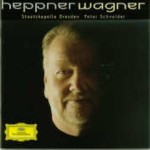I doubt whether referring to Ben Heppner as today’s finest Heldentenor would raise any objections; some might argumentatively call him today’s only Heldentenor. He seems to have everything–power, stamina, a bright, truly tenorial timbre (in contrast, say, with Melchior’s or Vinay’s more baritonal sound)–and he has grown up vocally at an intelligent pace, through Walther and Lohengrin into Tristan, while mixing in some Italian roles to keep the voice supple. Now on this recital he tackles Siegfried and Siegmund, roles he has not sung on stage, and judging from what we hear, he’s more than ready for them and Wagnerians should be waiting in line.
Wagner composed his operas specifically without excerptable “numbers” and so there are occasional awkward endings to the pieces presented here. The three bits from near the end of the first act of Die Walküre–“Ein Schwert verhiess mire der Vater”, “Wintersturme”, and “Siegmund heiss ich”–are presented without linking material, and “Wintersturme” feels particularly uncomfortable with its evening-at-Pops ending. Couldn’t DG have sprung for a Sieglinde to sing with its star Heldentenor? But Heppner is remarkable nonetheless. His combination of lyricism and sheer power are unique today: His cries of “Wälse!” are as brilliant as his “Wintersturme” is caressing and tender. He also never resorts to crooning soft moments; what we hear is a true range of dynamics, in real voice. Here and throughout, his diction is impeccable and the forward placement of his voice brings real urgency to his exclamation.
On to Siegfried. Not enough praise can be lavished on his “Forging Song”. I have never heard it sung as effortlessly, energetically, expressively, fearlessly, and with such true boyish joy. He attacks the music and text heroically–this Siegfried seems indomitable–and his tone never falters: it’s always big and bright. Mime is well sung by Burkhard Ulrich, who does not, as most stage Mimes do, attempt to steal the scene. The “Forest Murmurs” show us an entirely different side of Siegfried, tender and pensive, and Heppner delivers the solo to us with beautiful tone, enraptured. The second act’s final scene, without Woodbird, is by turns gentle and ardent. The scene from the third act, from Siegfried’s arrival at the rocky summit to right before he awakens Brünnhilde, is beautifully played by the Dresden forces, the “Weibmotif” lovingly intoned by the violin. Heppner’s amazement is palpable, and he phrases each mood change and new sensation with great freshness of tone. This segment also ends awkwardly, and Heppner’s involvement is so scrupulous that the listener is both surprised and disappointed when the opera doesn’t continue.
From Götterdämmerung we get only Siegfried’s last five minutes of singing–right before his death; but touching and stirring they are. “Siegfried’s Rhine Journey” and “Funeral Music” are played before and after, respectively, and it is here that conductor Peter Schneider makes the finest impression. He’s never less than good, but he lacks total identification in the Walküre excerpts. Overall, the Dresden Staatskapelle plays with luster and rhythmic thrust. This is a stunning CD, sure to delight and tease Wagnerians. Highest recommendation. [9/7/2006]
































